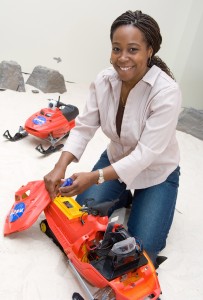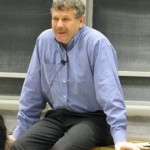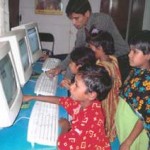Developing technology is the primary way we’re advancing toward the future, and yet in 2010, only 18.2% of American undergraduates studying computer science were women. To work in technology is to innovate, and innovation benefits from a diversity of minds, which often comes from a group of people who don’t look alike.
So where are the women? Maria Klawe has an answer.
The president of Harvey Mudd College, Dr. Klawe has helped transform the way computer science is reaching students. She was recently profiled in a New York Times story that examined how Harvey Mudd’s intro computer science class has been made-over to appeal to more learners:
Known as CS 5, the course focused on hard-core programming, appealing to a particular kind of student — young men, already seasoned programmers, who dominated the class. This only reinforced the women’s sense that computer science was for geeky know-it-alls.
“Most of the female students were unwilling to go on in computer science because of the stereotypes they had grown up with,” said Zachary Dodds, a computer scientist at Mudd. “We realized we were helping perpetuate that by teaching such a standard course.”
To reduce the intimidation factor, the course was divided into two sections — “gold,” for those with no prior experience, and “black” for everyone else. Java, a notoriously opaque programming language, was replaced by a more accessible language called Python. And the focus of the course changed [from] computational approaches to solving problems across science.
“We realized that we needed to show students computer science is not all about programming,” said Ran Libeskind-Hadas, chairman of the department. “It has intellectual depth and connections to other disciplines.”
See how inclusion is done? To embrace those who’ve traditionally been left out, it takes self-reflection, broad thinking, and action.
Harvey Mudd isn’t the only college to revamp its curriculum:
The University of California, Berkeley, and a few other universities have also redesigned their computer science courses to be less intimidating. The Berkeley course aimed at nonmajors is called “The Beauty and Joy of Computing.”
OK, that title is pretty patronizing, true?
Which alludes to the pain that we inflict on one another when we promote narrow ideas like “nerdly White and Asian men are meant for computer science,” messages that have intimidated Dr. Klawe. As a mathematician and computer scientist, she’s felt like an imposter sometimes. Jennifer Tour Chayes, a friend of hers at Microsoft, explained:
“Women are often [doubted], and then they take the impostor syndrome as their inner voice, as proof they shouldn’t go on,” she said. “What they need to know is that women like Maria also had that inner voice, and luckily they went on, and look how they’re doing.”
So what do we learn from these dynamics?
In spite of unequivocal evidence to the contrary, Dr. Klawe still has moments when she is convinced she is an impostor.
“If you’re constantly pushing yourself, and putting yourself in new environments, you’ll feel it over and over again,” she said. “So the only really important thing is not to let it stop you.”
Lesson learned: when we reveal what we want, and feel determined to get it, we’re not easily swayed by discouraging messages.
One preeminent computer scientist who has let little stop her is Dr. Ayanna Howard, associate professor at Georgia Institute of Technology, and pioneer of the “SnoMote,” an autonomous probe for research in icy climates. Having been awarded the distinction of “MIT Technology Review Top 100 Young Innovator of the Year,” her achievements have just begun.
When we open figurative doors for others, the world becomes a better place.
Now let’s dance. Madonna, Queen of Not Stopping, sings about natural progress in Jean-Baptiste Mondino’s video “Don’t Tell Me.” Watch and listen:
Image of Dr. Ayanna Howard with a SnoMote via




